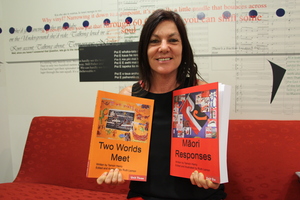Our congratulations to those in schools and in the media who are challenging historical ignorance in order to promote greater understanding and cooperation among Pakeha, Maori and other cultural groups. There are some fine, well-informed teachers, and some schools genuinely committed to a well-grounded education for being a New Zealander today.
In particular, we want to draw attention to the work of Tamsin Hanly, for 25 years a teacher at Newton Central School, and a talented researcher and writer. Tamsin has produced a resource kit for schools to enable teachers to work with children of any age on the real history of Aotearoa, from Maori settlement, through early interactions with Europeans, colonisation, and right up to the present.
Tamsin is Pakeha, has read and studied widely, and has taught such a programme for many years herself, as have others at Newton Central School. So the multi-media resources are wide-ranging, appropriate, and well-tried in practice, as well as based on the work of our most authoritative Pakeha and Maori historians.
When we were at school, Tanya and I learnt almost nothing about the history of Aotearoa – no mention of the Treaty of Waitangi that we can remember; Tanya thinks she once drew a picture of SirGeorge Grey, and Charmaine has a faint recollection of a story from the “Maori Wars”. We grew up with the notion that New Zealand was British, and race relations in New Zealand were the best in the world.
Both of us were privileged, however, to learn our real history through being challenged in our professional roles, in the 1980s, by outstanding Maori leaders, being able then to to read emerging new historical resources such as the work of Ranginui Walker, Claudia Orange, James Belich and Judith Binney, and to join active anti-racism groups.
But it seems that times haven’t changed much in many New Zealand schools. Few young people learn at school anything about the Declaration of Independence, Te Tiriti o Waitangi (as distinct from the English version), the Kingitanga and kotahitanga movements, the New Zealand Wars (the accepted official name for years now, replacing the misleading “Maori Wars”), the invasion of Parihaka, the Land March, the fight to establish Maori as an official language and to establish kohanga and kura kaupapa.. and much more of profound significance to our shared nation. Few would understand current Maori issues or Treaty claims, unless they watch Maori Television.
It’s easy for people with money to publicise their views by buying newspaper space. We’ve had a particularly obnoxious example lately, with full-page ads suggesting Maori are demanding to own all the fresh water in NZ and the government are giving in to them. (See the full page ad on page A26 in the NZ Herald of Saturday 16 April- and for more detailed comment on it, see the final item in our newsletter this month, Who Owns Our Water?)
It’s dangerously easy for those who don’t understand the past to be misled about the present. The only protection against the lies, half-truths and emotive appeals designed to stir up fear and reinforce bigotry is honest information and critical thinking.
Tamsin’s resources will help many teachers and students overcome ignorance with knowledge, and counter bigotry with rational thought and feeling.
- The resource website is : www. criticalhistories.nz
- The Facebook page is : https://www.facebook.com/criticalhistories/
- A bFM interview is available at: http://95bfm.com/bcasts/a-critical-guide-to-maori-and-pakeha-histories/
- A NZ Herald article is at: http://m.nzherald.co.nz/nz/news/article.cfm?c_id=1&objectid=11611357
- And a very good interview with Tamsin on National Radio can be found at: http://www.radionz.co.nz/national/programmes/sunday/audio/201797377/tamsin-hanly-taking-nz-history-into-schools
Please encourage your local schools to check out these resources – an investment in this kit will enable teachers to be well-informed, and children to learn in unthreatening ways about our shared history in this country. Then , maybe, the bigots will find fewer misinformed people to resource their hate-based campaigns.
Most important of all, younger people may begin to demand governments which truly enable our nation to move forward together, resourcing people according to their needs, righting injustices, telling the truth, and becoming a truly well-informed, inclusive, compassionate, courageous society.

 Earthsong Eco Neighbourhood
Earthsong Eco Neighbourhood Public Good
Public Good
Indeed, i have worked in Taranaki and spoken to local Pakeha who have no idea about the confiscations – an exhibition about the land wars at Puke Ariki sold an accompanying T-shirt with the ironic saying “don’t talk about the war”.
i am now working with Pakeha students who similarly have no knowledge of New Zealand history, but are keen to find out, and shocked when they do – wondering why their schooling was so deficient.